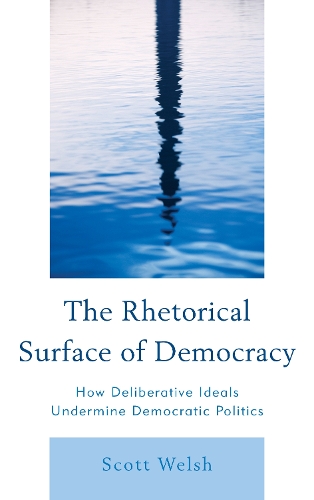
The Rhetorical Surface of Democracy: How Deliberative Ideals Undermine Democratic Politics
(Paperback)
Publishing Details
The Rhetorical Surface of Democracy: How Deliberative Ideals Undermine Democratic Politics
By (Author) Scott Welsh
Bloomsbury Publishing PLC
Lexington Books
10th June 2014
United States
Classifications
Professional and Scholarly
Non Fiction
Communication studies
Speaking in public: advice and guides
Media studies
321.8
Physical Properties
Paperback
206
Width 154mm, Height 227mm, Spine 15mm
295g
Description
Citizens, political theorists, and politicians alike insist that political or partisan motives get in the way of real democracy. Real democracy, we are convinced, is embodied by an ability to form collective judgments in the interest of the whole. The Rhetorical Surface of Democracy: How Deliberative Ideals Undermine Democratic Politics, by Scott Welsh, argues instead that it is our easy rejection of political motives, individual interests, and the rhetorical pursuit of power that poses the greatest danger to democracy. Our rejection of politics understood as a rhetorical contest for power is dangerous because democracy ultimately rests upon the perceived public legitimacy of public, political challenges to authority and the subsequent reconstitution of authority amid the impossibility of collective judgment. Hence, rather than searching for allegedly more authentic democracy, rooted in the pursuit of ever-illusive collective judgments, we must find ways to come to terms with the persistence of rhetorical, political contests for power as the essence of democracy itself. Welsh argues that the impossibility of any kind of public judgment is the fact that democracy must face. Given the impossibility of public judgment, rhetorical competitions for political power are not merely poor substitutes for an allegedly more authentic democratic practice, but constitute the essence of democracy itself. The Rhetorical Surface of Democracy is an iconoclastic investigation of the democratic process and public discourse.
Reviews
Scott Welsh has written a terrific book. It is so rich that this short review must pass over many of the thorny, deliciously complex, issues he raises. Welshs guiding light is Kenneth Burke, whose work he appears to have memorized, and he manages to replicate Burkes wide-ranging curiosity along with his refusal to accept prevailing pieties. ... Welsh does not shy away from the toughest questions and his meditations on them are always thought-provoking. He fully grasps the difficulties, even paradoxes, that are part and parcel of the democratic project. * Rhetoric Society Quarterly *
Asserting the impossibility of public judgment, collective will, and the common goodnotions underwriting most current theorists characterizations and celebrations of democracyThe Rhetorical Surface of Democracy builds an innovative conceptualization of rhetorical democracy that will undoubtedly spark spirited debate. Scott Welshs careful parsing of trends in democratic theory offers a complex discussion of the relationship between rhetoric, democracy, and power. [This book] provides readers new to democratic theory with a thorough and thoughtful engagement of foundational concepts, and it encourages readers well-versed in democratic theory to reevaluate taken-for-granted assumptions about the normative value of strategic rhetoric in democratic politics. -- Melanie Loehwing, Florida Atlantic University
Scott Welsh makes a lively case for considering rhetoric in the service of democracy as the strategic pursuit of power through words and symbols rather than as a dialogical pursuit of practical wisdom. Welsh provides a realistic discounting of idealistic models of deliberative democracy and political rhetoric. In place of an illusive common good, he argues for a conception of democracy that entails an ongoing nonviolent competition for habitable space. Welshs argument is a welcome provocation to revise our working assumptions about democracy and its rhetorical enactment. -- Robert L. Ivie, Indiana University
Any rhetorician who has become too complacent with platitudes about deliberative democracy and the 'common good' should welcome Scott Welshs book, The Rhetorical Surface of Democracy: How Deliberative Ideals Undermine Democratic Politics, with the same sense of gratitude that Socrates expressed toward Callicles: 'I realize that a person who is going to put a soul to an adequate test to see whether it lives rightly or not must have three qualities, all of which you have: knowledge, goodwill, and frankness' (Plato, Gorgias, 487a). All three of these qualities are indeed present in Welshs book: a comprehensive knowledge of major philosophers and contemporary rhetorical theorists; a refreshing frankness and critical eye toward democratic and rhetorical pieties; and a basic goodwill toward those he critiques. And, like a character in Platos Gorgias, Welsh enters the dialectical fray ready to take on all comers, using every argumentative resource to strip away illusions, undermine objections, reveal essential facts, and make us face up to the truth. And that truth is this: 'democracy is about individual people and power, not about producing an always fctitious common good or will of the people' (101). And from this truth follows the hard fact that those who champion such fctitious entities actually undermine democracy because 'they direct our energies to the imaginary collective production of shared judgments and common futures, leaving everyone disappointed, fearful, or resentful' (108). Here is a bold statement that Welsh upholds with considerable skill and forcefulness, making his book a contribution to rhetorical scholarship that warrants attention, particularly from those he challenges. * Rhetoric & Public Affairs *
Author Bio
Scott Welsh is assistant professor in the Department of Communication at Appalachian State University in Boone, North Carolina.
